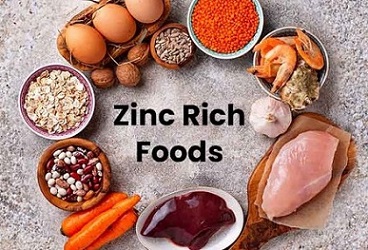Higher Dietary Iron And Zinc Intake Are Associated With Decreased Risk Of COVID-19 Infection And Hospitalization
Nikhil Prasad Fact checked by:Thailand Medical News Team Mar 08, 2024 1 year, 10 months, 6 days, 20 hours, 53 minutes ago
COVID-19 News: The ongoing battle against the global pandemic caused by the novel Coronavirus-disease 2019 (COVID-19) has prompted extensive research into various factors influencing infection susceptibility and severity. Among these, the role of dietary minerals has gained attention, particularly in older adults. This
COVID-19 News report delves into a comprehensive study conducted by Mashhad University of Medical Sciences in Iran, exploring the association between dietary mineral intake and the incidence of COVID-19 as well as the subsequent risk of hospitalization.
 Higher Dietary Iron And Zinc Intake Are Associated With Decreased
Higher Dietary Iron And Zinc Intake Are Associated With Decreased
Risk Of COVID-19 Infection And Hospitalization
Understanding the Immune System and Nutrition
The immune system plays a crucial role in protecting individuals from infectious diseases, including COVID-19. Nutrition is a key determinant of immune system function, with essential micronutrients such as zinc, copper, iron, selenium, magnesium, and fatty acids being vital for optimal immune response. Deficiencies in these micronutrients can increase susceptibility to infectious diseases. In the context of COVID-19, a study found that most patients were zinc deficient, leading to more complications, longer hospital stays, and increased mortality.
Complex Dynamics of COVID-19 and Advanced Data Analysis
Due to the complex and dynamic nature of COVID-19, traditional linear analysis methods may not be sufficient to fully understand its intricacies. Nonlinear mathematical approaches, such as dynamic system models, have proven effective in analyzing the interactions, feedback loops, and non-proportional relationships between variables in the context of the pandemic. The study conducted by Mashhad University of Medical Sciences is the first of its kind to employ dynamic system models to predict the relationship between dietary mineral intake and COVID-19 incidence and hospitalization.
Results of the Cohort Study
The study included 1957 participants aged 35 - 65, with dietary intake documented using a validated 65-item food frequency questionnaire (FFQ) since 2007. COVID-19 PCR test results were collected between February 2020 and June 2022. The analysis revealed that dietary intakes of magnesium, iron, and potassium were significantly lower in COVID-19-positive patients. After adjustments for age and sex,
dietary iron remained significantly associated with COVID-19 incidence, indicating a 6% reduction in the risk of infection with each unit increase in iron intake.
Furthermore, a significant relationship was observed between dietary zinc and hospitalization due to COVID-19, with a 31% reduction in the relative risk of hospitalization for each unit increase in zinc intake. Dynamic system models identified specific cut-offs for daily consumption of calcium, zinc, and iron, below which an increased risk of COVID-19 incidence was noted.
Discussion of Findings
;
The study's findings emphasize the significance of dietary mineral intake, specifically iron and zinc, in influencing the risk of COVID-19 infection and subsequent hospitalization. Iron, essential for various enzymatic processes and influencing viral pathogenesis, showed a clear association with decreased COVID-19 incidence. Similarly, zinc, crucial for immune system function, exhibited a notable correlation with reduced hospitalization risk.
Interestingly, the study also highlighted the role of calcium and iodine in COVID-19 susceptibility. While higher calcium intake was associated with decreased COVID-19 risk, an excess of iodine intake was linked to an increased risk, demonstrating the intricate interplay between dietary minerals and viral infections.
Limitations and Future Considerations
Despite the strengths of the study, such as its focus on past dietary intakes and the use of advanced data analysis methods, certain limitations should be acknowledged. The reliance on PCR results for identifying COVID-19 patients may introduce classification bias, as some individuals affected by the virus may not have undergone PCR testing. Additionally, the exclusion of individuals with missing dietary intake data and the lack of consideration for other factors like chronic diseases or dietary changes during the pandemic period may affect the generalizability of the results.
Conclusion
In conclusion, the study conducted by Mashhad University of Medical Sciences sheds light on the crucial role of dietary mineral intake in mitigating the risk of COVID-19 infection and subsequent hospitalization in older adults. Higher intake of iron and zinc was associated with a decreased risk of COVID-19 incidence and hospitalization, respectively. The dynamic system models provided valuable insights into specific cut-offs for calcium, zinc, and iron intake, emphasizing the importance of maintaining adequate levels of these minerals for optimal immune function and resilience against viral infections. As the world continues to grapple with the challenges posed by the COVID-19 pandemic, understanding the impact of nutrition on infection risk becomes increasingly vital for public health strategies.
The study findings were published in the peer reviewed journal: BMC Nutrition.
https://link.springer.com/article/10.1186/s40795-024-00821-5
For the latest COVID-19 News, keep on logging to Thailand Medical News.
